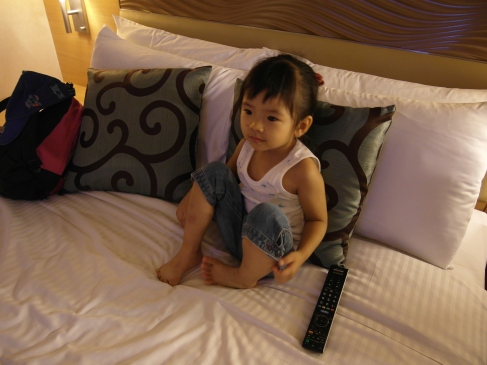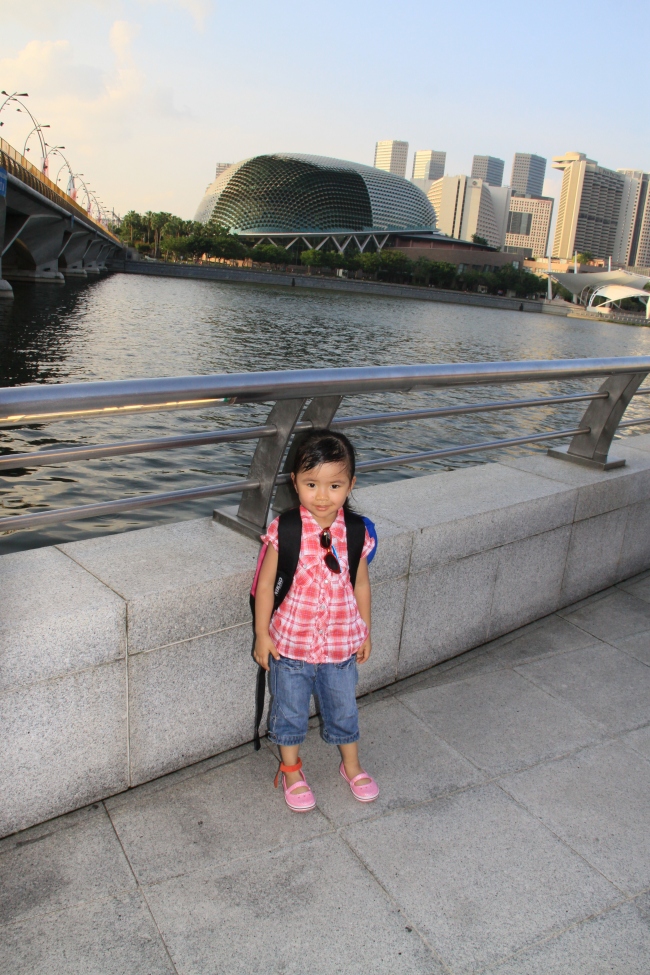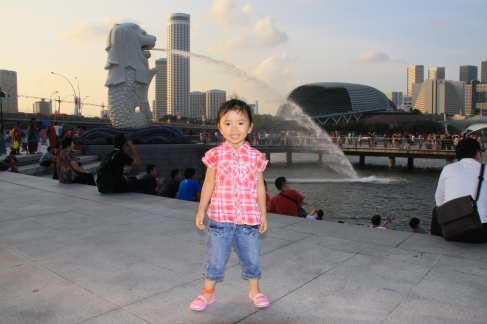
必讀輕聲調之(二)口語習慣
Reading gentle tones of (2) Oral habits:
普通話在說話語句中,增加了輕柔聲調,可以使普通話的語音,無論說起來或聆聽起來,都顯得有抑揚頓挫和有節奏感;由於普通話只有四個聲調,音域比較「單調」,增加了輕柔的聲調,可以使普通話無論是說起來或聆聽起來,都起伏有緻,優美動聽。
Mandarin speaking statement, the increase of soft tones, can make the Mandarin voice, whether speaking or listening, there are obviously a cadence and rhythm; since Mandarin only four tones, ranging more “monotonous", increases the gentle tone, whether the Mandarin speaking or listening, are undulating and emit beautiful sounds.
因此,說普通話時,在句語中,要注意輕音字和重音字的對比要強些,應該用輕音讀、輕音說的字,要做到足夠的輕;應該加重音韻的,要有足夠的加重音韻。
Therefore, when you speak Mandarin, in the sentence or the phrase, to pay attention to words and accent light tone contrast is stronger than words, should light reading light say the word, to achieve sufficient light; should increase the phonological, aggravating enough phonology.
以下節錄自朱自清散文《匆匆》其中一段,加上黑色陰影的字,使用輕柔聲調來讀,加上底線的字,使用較重音韻讀。
The following is extracted from Prose「Hurried busy rush」one paragraph, with black shadows of the word use of a soft tone to read, plus the underlined words, use of heavier phonological reading.
請你也來試讀一下,注意輕柔聲和加重音韻的對比,要有明顯的分辨。
If you would have to look probation, note that gentle sound and aggravating phonological contrast have a clear resolution.
燕子去了,有再來的時候;桃花謝了,有再開的時候。
yàn zi qù le,yǒu zài lái de shí hòu ; táo huā xiè le,yǒu zài kāi de shí hòu 。
Swallows may have gone, and there and then fly back; peach blossoms fade, they will bloom again.
聰明的你告訴我,我們的日子為甚麼一去不復返呢?
cōng míng de nǐ gào sù wǒ,wǒ men de rì zi wèi shén me yí qù bú fù fǎn ne ?
You the wise, tell me, our days, why is it gone?
你能夠處理這段文句的輕柔聲調和重音韻嗎?
Can you handle this gentle tones and heavy sentence phonology?
要注意的是:有些詞或字,單獨唸時,原本不是讀輕柔聲調,但是,當在進入語句後,由於語句節奏的要求,音韻就要讀得短一些及輕柔一些,尤其是一些虛擬詞或代名詞及常用的口語詞等,在語句中常常讀輕柔聲調。
It should be noted that: Some words or word, when read alone, had not read the gentle tone, however, when entering the statement, because statement rhythm requirement, Phonology should read it shorter and gentler, in particular, some virtual word or synonym and Common useage of spoken words etc; in the statement, often read gentle tones.
下面的例句,節錄自朱自清散文《背影》,要注意的是:詞語下加上底線的字,本來不是讀輕柔音韻,但在句子中,讀起來要讀輕聲音韻才較為動聽。
The following sentence, extracted from Prose「The shadow of my father」it should be noted that: Word wth underlined mark had not read the gentle rhyme, however, in the sentence, to read it more appealing phonological reading softly.
1你就在此地,不要走動。
nǐ jiù zài cǐ dì,bú yào zǒu dòng。
You just stay here and do not move around.
2家中光景很是慘淡。
jiā zhōng guāng jǐng hěn shì cǎn dàn。
Home situation was very poor.
3終於決定還是自己送我去。
zhōng yú jué dìng hái shì zì jǐ sòng wǒ qù。
He finally decided that he himself sent me to.
4走到那邊月台,須穿過鐵道。
zǒu dào nà biān yuè tái,xū chuān guò tiě dào。
Went beyond a platform to be crossed the railway.
5我趕緊拭乾了淚,怕他看見。
wǒ gǎn jǐn shì gān le lèi,pà tā kàn jiàn。
I quickly wiped the tears, fearing that he saw.
一般來說,輕柔音韻不會出現在配詞的詞首,只會出現在配詞的後綴詞,或連續三個音節的第二或第三個字上。
但在口語中,由於節奏或表達的需要,有些場合,句首的字也會讀出輕柔音韻。
Generally, gentle rhyme with the word does not appear in the first term only appear in the suffix word, or three consecutive syllables on the second or the third word.
But in the spoken language, since the expression rhythm or needs some occasions, the first sentence of the word will be read with gentle rhyme.
例如:For example:
1你行嗎?
nǐ xíng ma?
Are you okay?
2快去吧,別晚了!
kuài qù ba,bié wǎn le!
Go, do not be late!
3還說呢,事情都讓你給搞砸了。
hái shuō ne,shì qíng dōu ràng nǐ gěi gǎo zá le。
Said it, everything you screwed-up.
4你怎麼了?
nǐ zěn me le?
How do you do?
5他不幹了,說也沒用。
tā bú gàn le,shuō yě méi yòng。
He quit, even say more than it would be pointless.
6快開始吧,他們都來了!
kuài kāi shǐ ba,tā men dōu lái le!
Fast start now, they are coming!
要一時半會兒【yì shí bàn huìr】(短時間內)能夠達到標準,是不切實際;朋友們,只要堅持學習,尤其是由基礎起步;小朋友能夠完成的任務,我相信,你一定會達成心願。
To be able to meet the standards within a short time is impractical; my friends, if we continue to learn, especially starting from the foundation; Children can complete the task,
I believe that you will be fulfilled.
|
複習(21):Review(21):
|
|
普通話的字詞,每一個都應該會有音調,但是,有些組合字詞的音調讀起時,音調會又輕又短,這就是輕聲調詞語。(這些是必然要讀輕聲調的配詞。)
Mandarin words, each one should have a tone, but the tone of some combination of words read from time to time, the tone will be light and short, this is the light tones terms. (These words are bound to read softly tune.)
|
|
(1)【còu he】湊合
1下班以後,大夥兒都湊合在一起,練習唱歌。
xià bān yǐ hòu,dà huǒ ér dōu còu he zài yì qǐ,liàn xí chàng gē。
After work, everyone improvise together, practice singing.
2預先把發言提綱準備好,不要臨時湊合。
yù xiān bǎ fā yán tí gāng zhǔn bèi hǎo,bú yào lín shí còu he。
The speech outline ready in advance, do not offhand.
3沒有甚麼好菜,湊合着吃點唄!
méi yǒu shén me hǎo cài,còu he zhe chī diǎn bei!
Nothing good dishes improvise eat it!
4這兩年日子過得還湊合。
zhè liǎng nián rì zi guò dé hái còu he 。
These two years, life livable.
|
(2)【zhāo hu】招呼
1鄉親們都圍了上來,我不知招呼誰好。
xiāng qīn men dōu wéi le shàng lái,wǒ bù zhī zhāo hu shuí hǎo。
Neighbors and folks around us, I do not know how to greet them.
2招呼(吩咐)他趕快把做好了的文件送來。
zhāo hu(fēn fù)tā gǎn kuài bǎ zuò hǎo le de wén jiàn sòng lái。
Commanded them to send over the completed file to me.
3醫院裏對病人招呼(照料)得很周到。
yī yuàn lǐ duì bìng rén zhāo hu(zhào liào de hěn zhōu dào。
Hospital care for patients is very attentive.
4路上有冰,招呼(留神)滑倒了。
lù shang yǒu bīng,zhāo hu( liú shén ) huá dǎo le 。
There is ice on the road, be careful not to slip.
|
|
(3)【chēng hu】稱呼
1你說,我該怎麼稱呼她?
稱呼大嬸,行嗎?
nǐ shuō,wǒ gāi zěn me chēng hū tā?
chēng hū dà shěn,xíng ma ?
You say how can I call her?
Call Aunt, will you?
|
(4)【hán hu】含糊
1他的話很含糊,我不明白是甚麼意思。
tā de huà hěn hán hu,wǒ bù míng bái shì shén me yì si
He was rather vague I do not understand what it meant.
2 這事一點兒也不能含糊!
zhè shì yì diǎn ér yě bù néng hán hu !
This thing can not be a little vague!
3要比就比,我絕不含糊。
yào bǐ jiù bǐ,wǒ jué bù hán hu 。
To compete with a test, I do not vague.
|
|
(5)【yì si】意思
1大家受累了,得買些東西意思(表示一點心意)一下。
dà jiā shòu lěi le,dé mǎi xiē dōng xī(biǎo shì yì diǎn xīn yì)yì si yí xià 。
Everyone involved, I want to buy something to express my mind.
2天有點下雨的意思(事情的趨勢)。
tiān yǒu diǎn xià yǔ de yì si shì qíng de qū shì)。
The sky, there is a trend of rain.
3他看着工業展覽會上的新產品,感覺很有(趣味)意思。
tā kàn zhe gōng yè zhǎn lǎn huì shàng de xīn chǎn pǐn,gǎn jué hěn yǒu(qù wèi)yì si 。
He looked at the industrial exhibition of new products, he feels very interesting.
4天氣漸漸暖了,樹木有點兒發綠的意思(苗頭)。
tiān qì jiàn jiàn nuǎn le,shù mù yǒu diǎn ér fā lǜ de yì si( miáo tou )。
The weather is getting warmer the trees had signs of germination.
|
(6)【dān ge】耽擱
1因為有些事情沒辦完,在上海多耽擱了三天。
yīn wèi yǒu xiē shì qíng méi bàn wán,zài shàng hǎi duō dān ge le sān tiān。
Because some things were not finishing in Shanghai it needs more delayed three days.
2事情再忙,也不能耽擱治病。
shì qíng zài máng,yě bù néng dān ge zhì bìng 。
No matter how busy things, can not be delayed treatment.
3庸醫誤診,把病給耽擱了。
yōng yī wù zhěn,bǎ bìng gěi dān ge le。
Quack misdiagnosis, treatment to delay.
|
|
(7)【ěr duo】耳朵
an ear
|
(8)【tóu fa】頭髮
human hair on top of the head
|
|
(9)【fēng zheng】風箏
a kite
|
(10)【guān si】官司
a lawsuit
|
|
(11)【guī ju】規矩
rules
|
(12)【xiān sheng】先生
a gentleman
|
|
(13)【hé tong】合同
a contract
|
(14)【jiāo qing】交情
friendship
|
|
(15)【jiè zhi】戒指
a ring
|
(16)【kǒu dai】口袋
a pocket
|
|
(17)【kùn nan】困難
difficulties
|
(18)【má fan】麻煩
troublesome
|
|
(19)【mián hua】棉花
cotton
|
(20)【míng zi】名字
a name (of a person)
|
|
(21)【nǎo dai】腦袋
a brain
|
(22)【xiū xi】休息
to rest
|
|
(23)【zǎo shang】早上
morning
|
(24)【qīng chu】清楚
to be clear about
|
|
(25)【wǎn shang】晚上
in the evening
|
(26)【shōu shi】收拾
to put things in order
|
|
(27)【shū fu】舒服
comfortable
|
|
親愛的同學、朋友們,「學無前後,達者為先」,讓我們為這一句富於哲理的說話,亙相共同勉勵!
Dear students, friends, “Learning without front and rear, reached by first". Let us handle this one ancient philosophy statement, of mutual encouragement!
我的「漢語拼音」教學影片原本計劃將在2013年7月下旬在You Tube 出現,但是,由於教學課本尚在編寫階段,我想,有可能會延期到2013年8月下旬,到時請前往:
My “Pinyin" instructional videos originally planned to end in July 2013 appeared in You Tube, but because of school textbooks still in stages of preparation, I think, there may be postponed until the end of August 2013, when go
WWW.YouTube.Com/user/mastertsang1





